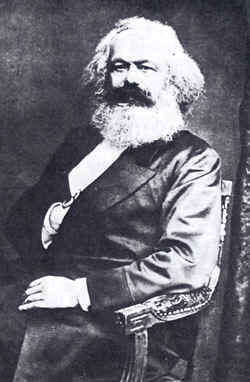Karl Marx was born in 1818 and died in 1883. Marx was a German Jew. His father was a lawyer. When Marx was six years of age, his family became Christian but religion never appealed spiritually to Marx who later referred to it as “the opium of the people”.

In 1842, Marx joined the staff of the newspaper the “Rheinische Zeitung” and became its editor. The views expressed in it quickly came to the attention of the authorities and it was suppressed. Marx went to Paris. In 1845, he was expelled from Paris and went to Brussels. Here, he joined the Communist League, and stimulated its growth. In 1848, Marx, supported by Engels, completed the “Communist Manifesto”. This was a mixture of others people’s beliefs consolidated into one. Marx never denied that he was less than original in his thinking – his skill was interweaving other people’s ideas into one. This in itself was a major achievement as many of those who influenced him, were frequently at intellectual odds with others who also influenced Marx. He took what appealed to him and ended with a relatively small book that was to revolutionise society.Marx was interested in Hegelian philosophy. He studied it at university but ended up rejecting most of it as he believed that Hegel had mixed up most issues relevant to C19th society.
The “Communist Manifesto” stated that all men were born free but that society had got to such a state that the majority were in chains. Engels referred to the book as being the “very way of life”.
In 1848, Western Europe was swept by a wave of revolutions. Marx wanted to use this chaos to his advantage and used a newspaper, the ‘Neue Rheinische Zeitung’ to launch his ten points:
1) The abolition of the property/ownership of land.
2) Income tax to be graded to income – the more an individual earned, the more they paid. The less you earned, the less you paid.
3) Abolition of all rights of inheritance.
4) The confiscation of all property of emigrants and rebels.
5) The centralisation of all credit into the hands of the state by means of a national bank with state capital and an exclusive economy.
6) Centralisation of all means of communication and transport into the hands of the state.
7) The extension of factories and the instrument of production owned by the state. Bringing into cultivation all land not being used that could be and an improvement in the fertility of the soil.
8) The equal obligation of all to work and the establishment of an industrial and agricultural armies.
9) The combination of agriculture and manufacturing industries with the gradual abolition of the distinction between town and country by the more equable distribution of the population over the country.
10) Free education for all children in public schools. The abolition of child labour in factories; an educated child would be better for society in the long term, than a child not educated.
The reaction to Marxism:
Marxism made people think about the society they lived in. Ironically, Marxism produced many ideological offshoots – those who agreed with eight of his ideas but criticised two, for example, or supported five but not the other five. As a result of this, Marxism as an entity came under strain.
The main criticism of Marx was that he undervalued non-economic forces and that he wrapped a great deal of his beliefs in an economic shell at the expense of non-economic issues. Those who criticised Marx said that he failed to take into account patterns of culture and a country’s traditions.
Another criticism of Marx was that what he wrote was very vague and open to interpretation, especially what would happen after a proletariat revolution.
Those who supported Marx said that his beliefs gave the working class hope of a better life. They said that the workers would be inspired by an intellectual who was on their side and who was fighting their cause. In 1898, the Russian Social Democratic Party was formed to expand Marx’s beliefs in Russia.
Marxism was a difficult belief to apply in Russia as the nation was primarily an agricultural nation and Marx had based his beliefs on an industrial society such as Germany or Britain. The conservatism, lack of any education and superstition that existed in the rural areas of Russia meant that Marx was less than enthusiastically welcomed – even with his promise of land reform. Marx had based a great deal of his support on the industrial workers – and it needed people in Russia to organise these people. Some tried to organise trade unions that were easily infiltrated by the police. It needed Lenin to make the industrial workers a more dynamic group capable of pushing through a revolution.